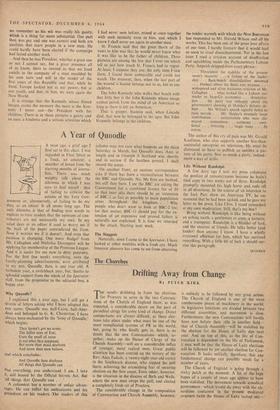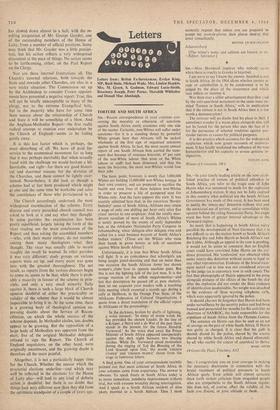The Churches
Drifting Away from Change
By PETER KIRK THE results dribbling in from the elections for Proctors to serve in the two Convoca- tions of the Church of England show, as was expected, a considerable desire on the part of parochial clergy for some kind of change. Direct comparisons are always difficult, as these elec- tions take place under what must be one of the most complicated systems of PR in the world, but, going by who finally gets in, there is no doubt that the new Convocations—which, to- gether, make up the House of Clergy of the Church Assembly—will see a considerable influx of younger, more radical men. Great public attention has been centred on the victory of the Rev. Alan Esdaile, a twenty-eight-year-old curate in the Southwark diocese, who topped the poll there, achieving the astonishing feat of securing election on the first count. Even odder, however, is the situation in the diocese of Bath and Wells, where the new men swept the poll, and elected a completely fresh set of Proctors.
The considerable change in the composition of Convocation and Church Assembly, however,
is unlikely to be followed by any great action. The Church of England is one of the most cumbersome pieces of machinery in the world; its legislative functions are divided between two different assemblies, and movement is slow. Furthermore, the new Convocations- will hardly have met before their role in another field— that of Church Assembly—will be stultified by the election for the House of Laity due next year. And on top of this, as the life of Con- vocation is dependent on the life of Parliament, it may' well be that the House of Laity elections will be followed by yet another election for Con- vocation. It looks unlikely, therefore, that any fundamental change can possibly result for a number of years.
The Church of England is going through a sticky patch at the moment. A lot of the high hopes of a couple of years ago appear to have been stultified. The movement towards synodical government—which would do away with the ab- surdities contained in the present medieval structure (with the House of Laity tacked on)—
has slowed down almost to a halt, with the re- sulting resignation of Mr. George Goyder, one of the outstanding members of the House of Laity, from a number of official positions. Some may think that Mr. Goyder was a little precipi- tate, but his action reflects a very widespread discontent at the pace of things. No action seems to be forthcoming, either, on the Paul Report on the Clergy.
Nor are these internal frustrations all. The Church's external relations, both towards the State and towards other Churches, are also in a very tricky situation. The Commission set up by the Archbishop to consider Crown appoint- ments have presented a negative report. True, this will not be totally unacceptable to many of the clergy, nor to the extreme Evangelical laity, but to the majority who have for some time been uneasy about the relationship of Church and State it will be something of a blow. And the Anglican-Methodist Report—the first really radical attempt at reunion ever undertaken by the Church of England—seems to be fading gently away.
It is this last factor which is, perhaps, the most disturbing of alt. We have all paid lip- service to the ecumenical movement for so long that it was perhaps inevitab1.4 that when. actually faced with the challenge we would hesita4e a bit. Inevitable, and right—for there are good histori- cal and doctrinal reasons for the division of the Churches, and these cannot be lightly over- turned. Nevertheless, it did look as though a scheme had at last been produced which might at one and the same time be workable and salve the consciences of those who participated in it.
The Church accordingly undertook the most widespread examination of the scheme. Every diocese and every parochial church council was asked to look at it and say what they thought. In some parishes the examination has been pretty superficial, largely taking the form of the vicar reading out the main conclusions of the Report and then asking the assembled members —who, with their Many virtues, do not number among them many theologians--what they thought. The vicar was usually able to secure roughly the result he wanted. In other parishes it was very different;' study groups on various aspects were set up, and every point was gone into with the greatest thoroughness. The net result, as reports from the various dioceses begin to come in, seems to be that, while there is prob- ably a majority in favour of the scheme in prin- ciple, and only a very small minority flatly against it, there is such a large block of Church opinion doubtful of either the practicality or validity of the scheme that it would be almost impossible to bring it in. At the same time, there is a growing body of theological opinion ex- pressing doubts about the Service of Recon- ciliation, on which the whole success of the scheme depends. In Methodist circles, too, doubts appear to be growing. But the opposition of a large body of Methodists was apparent from the start; five of the original Methodist delegates refused to sign the Report. The Church of England negotiators, on the other hand, were originally unanimous, and the growing doubt is therefore all the more painful.
Altogether, it is not a particularly happy time for the Church. Whether the unease which the proctorial elections underline—and which may well • be reflected in the elections for the House of. Laity also—will lead to any kind of definite action is doubtful, but there is no doubt that things look very different now than they did from the optimistic standpoint of a couple of years ago.



































 Previous page
Previous page